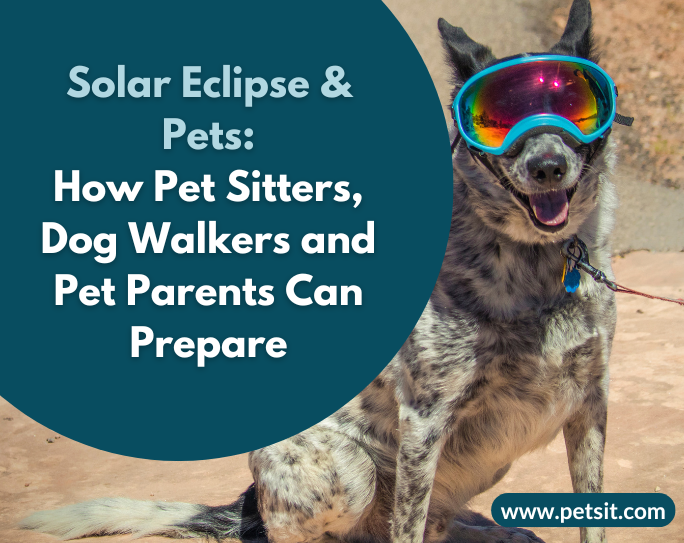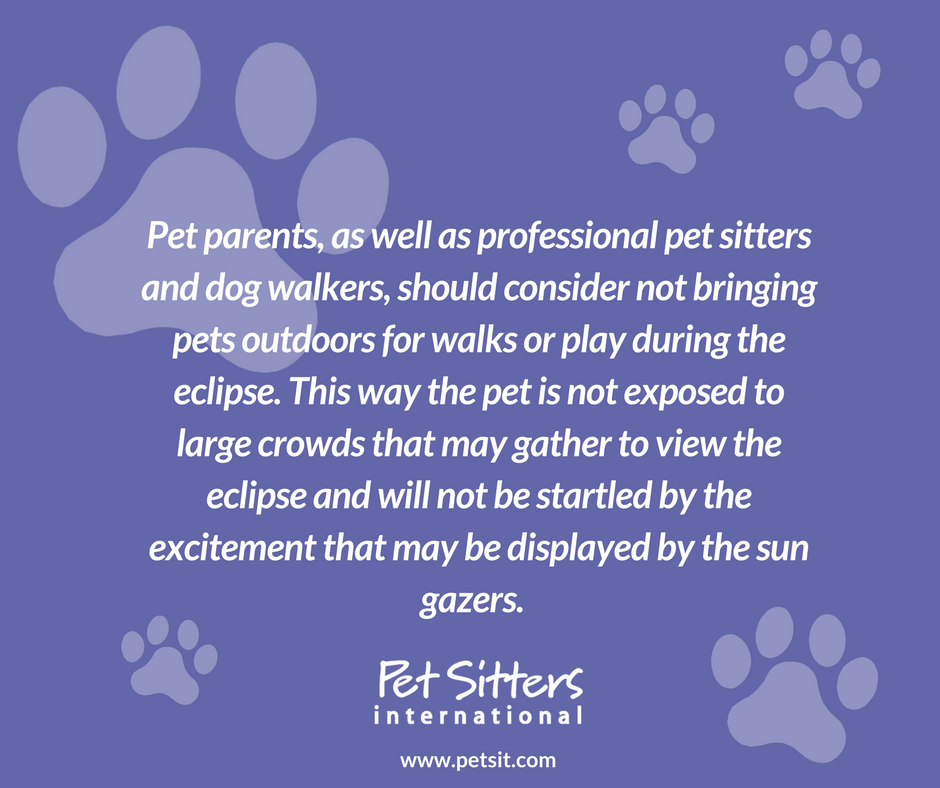Solar Eclipse and Pets: How pet sitters, dog walkers and pet parents can prepare
Updated March 27, 2024 | Originally published August 17, 2017
The blog post below was originally published in 2017 before the Aug. 21 solar eclipse that year. With the upcoming solar eclipse in April 2024, we have republished this blog post as the tips provided are still relevant—and we've added some new information as well!
 The dog featured above is wearing dog goggles, but you should check with your veterinarian and/or reputable sources to determine if any eyewear is approved for solar eclipse viewing.
The dog featured above is wearing dog goggles, but you should check with your veterinarian and/or reputable sources to determine if any eyewear is approved for solar eclipse viewing.
Mark your calendars for the total solar eclipse.
With a total solar eclipse scheduled to cross the United States on April 8, 2024, many pet parents, professional pet sitters and dog walkers are unsure of any special precautions that should be taken for pets.
Not sure what time the eclipse will occur where you live? In this article from USA Today, you can enter your ZIP code or city to find the exact time your area will be impacted.
Does the solar eclipse pose a danger to pets?
Because cats and dogs inherently don’t stare at the sun, the possibility of eye damage is highly unlikely. At a NASA news conference Angela Speck, director of astronomy and professor of astrophysics at the University of Missouri, explained that pets do not try to look at the sun on a normal day and will not do it during the solar eclipse either.
However, an article published on LiveScience.com advises that it’s better to be safe than sorry. The article explains that as the moon’s shadow begins to block the sun’s light during the eclipse, the parts of the sun that continue to be visible can burn any eyes, including pets. So, while it’s extremely unlikely a cat or dog would look to the sun, the Live Science articles notes advice from an astronomy professor that recommends outfitting pets with protective glasses if they’ll be outside, just to be safe.
And pet sitters and dog walkers should wear special protective glasses, too, if they plan to view the eclipse. NASA’s safety page provides important tips.
While domestic pets will be largely unaffected by the eclipse, farm animals such as cows and horses may head back to their barns, mistaking the eclipse for nighttime. Similarly, chickens, as well as insects and frogs, may be prompted to begin their nighttime rituals.
Additionally, this article posted by the Indianapolis Star shares that the eclipse could cause cause discomfort for dogs, cats, and even horses. In the article, Raffaela Lesch, an assistant professor of biology at the University of Arkansas at Little Rock, explains that "indoor cats may be unbothered by the eclipse, but outdoor cats, dogs and other outdoor animals might experience confusion or frustration at the changing environment."
Because there is not extensive data regarding pets’ reactions to a total solar eclipse, the California Academy of Sciences has invited the public to help track pets’ reactions. They encourage citizens to download the iNaturalist app on the App Store or Google Play and join the Life Responds project.
Best advice for pet owners and pet sitters during the eclipse
While damage to pets’ eyes are unlikely, pet parents, as well as professional pet sitters and dog walkers, should consider not bringing pets outdoors for walks or play during the eclipse. Keep pets indoors with windows closed and shades or curtains drawn.
Pet sitters and dog walkers may consider adjusting their schedules to offer their walks at least thirty minutes before or after the eclipse, or recommend that walks for the day be replaced with indoor play instead.
This way the pet is not exposed to large crowds that may gather to view the eclipse and will not be startled by the excitement that may be displayed by the sun gazers.
If pets will be outdoors, take extra precautions and ensure that all pets have proper identification tags should they be spooked and flee.

You can learn more about the total solar eclipse on NASA’s website.
Are you making any special arrangements or altering walking schedules for your pets or your clients’ pets during the eclipse? Let us know in the comments below.







Comments
Dawn Adams
Adrienne Cilliers
I received praise from clients and some guff from other professionals as being an alarmist when posting to the group (I ended up deleting the post as it was miscontrued for announcing our plans to have all visits end 45-minutes prior and not to begin until a minimum of 30-minutes after) because yes while the danger to pets unlikely, it is possible and we didn't want it to happen on our watch, as well as notifying clients not under our care that they may want to consider leaving pets indoors. Safety for our sitters and pets always a top priority.
Thanks for the backup and support!
Angela Sexton